-
 Art of Wellness Acupuncture & Traditional Chinese Medicine (TCM)11704 Wilshire Blvd, Suite 295, Los Angeles, CA, 90025
Art of Wellness Acupuncture & Traditional Chinese Medicine (TCM)11704 Wilshire Blvd, Suite 295, Los Angeles, CA, 90025
myartofwellness@gmail.com310-451-5522 Office Hours
MonClosedTue7:30 am --4 pmWed7:30 am --4 pmThu7:30 am -- 4 pmFri7:30 am -- 4 pmSat7:30 am -- 4 pmSunClosedOur office opens from Tuesdays to Saturdays 7:30 am to 4 pm, will be closed on Memorial day, Independent day, Labor day, Thanksgiving day, Christmas and New year.
-
Recent Posts
- How to Treat De Quervain’s Tenosynovitis With Acupuncture and TCM
- Chinese New Year 2026: Year of the Horse
- Acupuncture and TCM Treatment for Perimenopause Symptoms
- How to Treat Insulin Resistance With Acupuncture and TCM
- How to Treat Metabolic Syndrome With Acupuncture and TCM
- How to Treat Syncope With Acupuncture and TCM
- How to Treat Thoracic Outlet Syndrome With Acupuncture and TCM
- How to Treat Dupuytren’s Contracture With Acupuncture and TCM
- How to Treat Nutcracker Syndrome With Acupuncture and TCM
- How to Treat Rosacea With Acupuncture and TCM
- How to Treat Perioral Dermatitis With Acupuncture and TCM
- Lymphatic Drainage With Acupuncture and TCM
- How to Treat Turf Toe With Acupuncture
- How to Treat Nerve Pain With Acupuncture and TCM
- How to Treat Watery Eyes With Acupuncture and TCM
- How to Treat Ovarian Cysts With Acupuncture and TCM
- Sign up to receive news and updates and get my free report:“The Top 10 Reasons to Try Acupuncture”

December 2025 M T W T F S S 1 2 3 4 5 6 7 8 9 10 11 12 13 14 15 16 17 18 19 20 21 22 23 24 25 26 27 28 29 30 31
infertility
How to Treat Hashimoto’s Disease With Acupuncture and TCM
By Qineng Tan, L.Ac., Ph.D. and Xiaomei Cai, L.Ac., Ph.D.
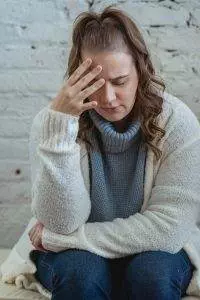
Goiter, enlarged thyroid? Tired all the time, feeling weak, sensitive to cold? Constipation, weight gain, hair loss? These can all be hypothyroidism symptoms. Hashimoto’s disease is an autoimmune disorder that causes low thyroid symptoms. Acupuncture and TCM can offer an alternative hypothyroidism treatment and address Hashimoto’s thyroiditis symptoms.
Recent data shows that hypothyroidism is fairly common. In the U.S., where it was previously thought that about 5% of the population may have some signs of hypothyroidism, more recent research shows that that number is over 10%. While people of all ages can have signs of hypothyroidism, it is most common among women over 50.
The thyroid and the pituitary gland work to release various thyroid hormones that control metabolism and other processes. The primary thyroid hormones are thyroxine (T3) and triiodothyronine (T4); Thyrotropin (TSH) is the hormone that stimulates the production of T3 and T4.
The normal TSH level for most adults is in the range of 0.27 – 4.2 uIU/mL. Lower TSH levels are often a sign that the body is producing too much thyroid hormone, which leads to symptoms of hyperthyroidism, which is often due to Graves disease, which is also an autoimmune thyroid disorder.
When TSH levels are high, there is probably too little thyroid hormone, or low thyroid hormone levels. Hypothyroidism is considered “overt” when a person has high TSH levels and low T4 levels. A person is considered to have subclinical hypothyroidism when their TSH is elevated, but T4 is in the normal range.
Hashimoto’s disease, also known as chronic thyroiditis, is the most common cause of hypothyroidism, but because it is a slowly progressing autoimmune disorder, it can take years for symptoms for thyroid to show up.
Hypothyroidism causes, or risk factors for Hashimoto, include: genetics, changes in hormones during pregnancy, and the presence of other autoimmune diseases. It is possible to have Hashimoto’s thyroiditis and also have another autoimmune condition, such as Rheumatoid arthritis, Celiac Disease, Lupus, or Type 1 Diabetes.
In some cases, hypothyroidism can be caused by an iodine deficiency in the diet. This is rare in the U.S., though, and iodine supplementation is not helpful in cases of hypothyroidism that are not caused by a lack of iodine.
Acupuncture and TCM are excellent modalities for treating all kinds of autoimmune disorders, because they work holistically to treat both the root causes of the problem, and hypothyroid symptoms.
Top 10 Hashimoto Disease Symptoms
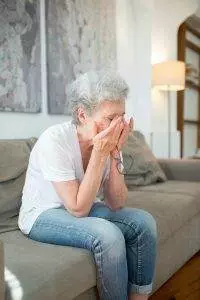
Signs of thyroid issues can take a long time to become severe enough that people notice them and seek diagnosis and treatment. Hypothyroidism symptoms can just seem like “normal” fatigue or other signs of aging.
Sometimes when people visit their primary care doctor, and they run a typical panel of blood tests, thyroid hormone levels are still in the normal range, so no treatment is recommended.
However, hypothyroidism symptoms typically come on gradually, and will likely get worse with time, as the disease progresses.
Hashimoto’s Disease Symptoms include:
- Fatigue, sluggishness, tired all the time
- Drowsiness, sleepy all the time
- Increased sensitivity to cold, feel cold all the time
- Dry skin, brittle nails, hair loss, puffy face
- Muscle pain, muscle stiffness, muscle weakness, joint pain, stiff joints
- Swollen thyroid, enlarged thyroid gland, goiter, swollen tongue
- Memory problems, difficulty concentrating, foggy head
- Change in menstrual cycle, irregular menstruation, heavy bleeding during period
- Weight gain
- Depression, mental health problems
If hypothyroidism is not treated, it can lead to serious complications. These may include: heart problems or cardiovascular diseases, like irregular heartbeat (arrhythmia) and high cholesterol.
Hashimoto’s can cause problems with sexual function, libido, and fertility in both men and women.
In rare cases, people with untreated low thyroid levels can develop Myxedema. Myxedema is the term for advanced, severe hypothyroidism, which can lead to:
- Low blood pressure
- Low heart rate
- Low blood sodium levels
- Low blood oxygen levels
- Low body temperature (hypothermia)
- Mental confusion
In extreme cases, Myxedema can lead to a health crisis in which a person may go into shock, a coma, or seizures. Myxedema crisis requires immediate emergency care.
Hypothyroidism can develop slowly, with minimal symptoms. However, it is important to get proper diagnosis and treatment for Hashimoto’s thyroiditis. As time goes on, untreated hypothyroidism can lead to more complications.
Medical Treatment for Hashimoto’s Disease
Getting a diagnosis for Hashimoto’s disease will usually involve a series of blood tests. As an autoimmune disorder, Hashimoto involves the production of antibodies that mistakenly attack healthy cells. In the case of Hashimoto’s thyroiditis, an antibody test may show that the immune system is making TSO antibodies. Thyroid peroxidase (TSO) a protein that is vital to the production of thyroid hormone.
In addition, blood tests will show if there is elevated TSH and/or low levels of T4. If a person has symptoms, or an enlarged thyroid gland, and high TSH levels, then a diagnosis of Hashimoto’s may be made, whether or not the T4 levels are low.
An ultrasound can indicate that there is swelling or inflammation in the thyroid gland.
Hypothyroidism Medication
The usual treatment for Hashimoto’s disease is hormone replacement. Levothyroxine, under the brand names Levoxyl, or Synthroid, is usually given in pill form. This hypothyroid medication mimics the action of T4 hormone.
For many patients, medications for low thyroid will help to stabilize the TSH and T4 levels, and symptoms will improve. However, for some people, the continued autoimmune disorder process continues to cause symptoms, even when thyroid hormone levels are in the normal range.
In these cases, doctors may recommend surgery. A thyroidectomy involves the removal of some or all of the thyroid gland. After a thyroid surgery, a person will need to continue taking thyroid hormone replacement medication, as they will not produce any without the thyroid gland.
Acupuncture and TCM treatment offer an alternative or adjunct therapy for Hashimoto’s disease, which can help improve immune function and address symptoms.
Can Acupuncture Help Hashimoto’s?
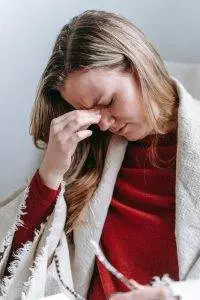
Acupuncture works by harmonizing the Qi (life force energy) of the organ systems of the body. When Qi is out of balance, then some bodily processes happen in excess, and others are deficient. A TCM practitioner observes and listens carefully to each person’s individual experience of symptoms to discover which organs are out of balance.
In the case of hypothyroidism and Hashimoto’s, deficiency of Qi and blood can be building up over a long period of time, and gradually begin to impact organs: mainly, the kidneys, spleen, and heart.
For a while, while the condition is still what conventional medicine considers to be subclinical hypothyroidism, the spleen Qi is weak, and causes some symptoms, like weakness and fatigue.
Then, as the situation progresses, the kidney Qi is affected, and more symptoms begin to occur. Yang Qi is not able to warm the organs enough, so dampness and cold begin to accumulate. This causes symptoms like constipation, swollen joints, brain fog, and memory problems.
Chronic kidney and liver qi deficiency can cause menstrual problems, and infertility.
If the problem continues, then the heart is affected, too, and cardiovascular symptoms begin to arise, like palpitations, respiratory problems, and low blood pressure.
The acupuncturist deduces from the pattern of symptoms which organs are affected, and then uses acupuncture treatment, herbs, and other modalities like cupping or moxibustion to bring more energy to depleted areas and help nourish them.
Can TCM cure hypothyroidism? Not exactly, but research has shown that acupuncture is a safe and effective treatment for thyroid disorders, whether it is used as an alternative medicine for Hashimoto’s disease, or as an adjunct therapy.
Case studies have shown that regular acupuncture treatment can help stabilize thyroid hormone levels, slow the progression of the autoimmune disease, reduce symptoms, and improve quality of life.
For those who are trying to conceive and are struggling with infertility issues due to thyroid disorders, acupuncture can be a holistic treatment that helps balance hormones and improve fertility. Acupuncture treatment may help prevent miscarriage due to autoimmune conditions.
Acupuncture can also be helpful for pain management after a thyroidectomy procedure.
Acupuncture Near Me for Hashimoto’s Disease – West Los Angeles Area
Acupuncture is an excellent modality for helping to treat many autoimmune diseases and thyroid conditions, including Graves disease, hyperthyroidism, and chronic fatigue syndrome. TCM can also help with menopause and perimenopausal symptoms, which often occur concurrently with hypothyroidism in women over 50. Acupuncture can also help with all kinds of mental health problems like depression and anxiety, which may be related to underlying physical conditions.
*This article is for education from the perspective of Traditional Chinese Medicine only. The education provided by this article is not approved by FDA to diagnose, prevent, treat and cure human diseases. It should not stop you from consulting with your physician for your medical conditions. Traditional Chinese Medicine is based on Qi, which is an invisible force that usually cannot be observed by modern science. Because science focuses on testing ideas about the natural world with evidence obtained through observation, these aspects of acupuncture can’t be studied by science. Therefore acupuncture and Chinese herbs are often not supported by double-blind, randomized trials, and they are considered alternative medicine therapies in the United States.
How to Treat Ovulation Pain With Acupuncture and TCM
By Xiaomei Cai, L.Ac., Ph.D. and Qineng Tan, L.Ac., Ph.D.

Cramping during ovulation, ovary pain, ovulation pain on one side? Ovulation cramps are very common. Acupuncture and TCM can help ease severe ovulation pain and help with all kinds of ovulation disorders.
The medical term for ovulation pain is “Mittelschmerz,” which means “middle pain” in German. The term Mittelschmerz syndrome refers to the fact that ovulation cramps occur in the middle of the menstrual cycle, typically about 14 days before the next menstrual period.
Studies have suggested that 35-50% of people who ovulate experience cramping during ovulation. Other ovulation symptoms include:
- Ovulation pain on one side
- Pelvic pain, abdominal pain
- Dull ache or sharp twinge of pain in pelvis
- Vaginal pain during ovulation, vaginal cramps
- Cervical cramps, cervix cramps, cervical pain
- Pain around or near the tailbone, tailbone pain
- Back pain, hip pain, or rib pain
- Bloating, bloated stomach
- Fatigue
- Breast tenderness
- Mood swings
- Spotting
- Nausea
- Diarrhea
- Lack of appetite
The process of ovulation involves luteinizing hormone (LH) stimulating follicles on the ovary to mature then break free from the ovary and move through the fallopian tube.
Follicles are like small cysts which stretch the surface of the ovary and then rupture. Blood and other fluids may be released, and this may be part of what causes pelvic pain during ovulation.
Estrogen levels are usually at their highest at the time of ovulation, which can contribute to water retention and uncomfortable bloating in the pelvic area.
For people who are trying to get pregnant, ovulation pain and fertility—or ovulation pain and pregnancy success—may seem related, because the cramping lets them know when they are most fertile.
Many people never notice any signs of ovulation if they aren’t specifically watching for them. For some, ovary pain during ovulation is a sharp cramp that only lasts a few minutes, or a few hours. For others, ovulation pain and pelvic cramps can be so severe that they are debilitating.
Acupuncture and TCM treatment can help relieve ovulation cramps and help regulate hormones to alleviate other ovulation symptoms and problems, as well.
What Causes Ovulation Pain?
Why do some people experience more severe ovulation pain than others? Medical science has not determined exactly why some people experience pain during ovulation and others don’t.
Sometimes ovulation pain can be so bad that people go to the emergency room. In this case, doctors will want to rule out other possibilities. Many conditions can cause pelvic pain, including:
- Appendicitis
- Constipation
- UTI
- IBS
- Celiac disease
- Interstitial cystitis
- Kidney stones
- Gallbladder attack
- Ulcer
- STIs
- Bowel obstruction
- Hernia

Pelvic pain that is related to the reproductive organs can include:
- Menstrual cramps, PMS, dysmenorrhea, painful periods
- Ovarian cyst, ruptured ovarian cyst, twisted ovarian cyst
- Endometriosis
- Uterine fibroids, leiomyoma of the uterus
- Pregnancy
- Ectopic pregnancy
- Pelvic inflammatory disease
- Scar tissue in the pelvic area
- Cancers of the reproductive organs
These conditions not only cause pain, but may interfere with fertility if and when you are ready to conceive.
Endometriosis Ovulation Pain or Ovarian Cyst Pain?
Ovary pain may be related to other issues, apart from ovulation.
Some women begin to experience more ovulation pain when they are going through perimenopause, due to changing estrogen levels.
Ovarian cysts—sacs filled with fluid that develop on the ovaries—are very common. These usually form during ovulation and then go away on their own. However, in some instances, they grow larger, and can cause considerable pain.
Signs of ovarian cyst may be a constant ache, or one that comes and goes, or sudden, sharp pains that happen occasionally. Other ovarian cyst symptoms include: bloating, swelling, and pressure in the pelvic area. If the cyst ruptures, there may be a very sudden, severe pain on one side, and if the cyst becomes twisted or torqued, there may be severe pain accompanied by nausea or vomiting.
Polycystic ovarian syndrome (PCOS) is a hormonal condition in which a person does not ovulate regularly. In many cases, lots of small cysts form on the ovaries, which can cause bloating and pelvic pain.
Ovulation pain can be differentiated from PCOS or ovarian cyst pain mainly by the fact that it occurs only during a specific window of time during the ovulation cycle. If you are using a fertility calculator (ovulation calculator) to track your cycle, then you may be more aware of how your ovulation cycle works and when your fertile window is going to occur.
Endometriosis is a condition in which uterine lining tissues develop in other areas of the body, particularly on the ovaries and fallopian tubes. One of the primary symptoms of endometriosis is pelvic pain, which can be severe and happen at any time during the menstrual cycle. Some people report increased pain during ovulation, as well as severe menstrual pain.
Endometriomas (also known as “chocolate cysts”) can develop in and around the ovaries. There can also be scar tissues, or adhesions, around the ovaries. These tissues may contribute to the increased pain ovulation can cause when you have endometriosis. In these cases, the pain may radiate to other areas, even down to the thighs. Having sex may also be painful around the time of ovulation.
It is important to consult with a health professional if you are experiencing ovary pain, vaginal pain or severe menstrual pain.
PCOS and endometriosis not only cause pain and other uncomfortable symptoms, but can lead to infertility.
If your periods are irregular, or you have reason to suspect that you are not ovulating, it is important to seek health care. Severe pain or missed periods may be sending a signal that there is a deeper issue that needs to be addressed.
Treatment for Ovulation Pain
Ovulation pain may not occur every month. Some people may get relief from occasional ovulation pain by taking over the counter pain relievers like ibuprofen.
If ovary pain is happening frequently and is unbearable, a doctor may recommend hormonal birth control, like oral contraceptives or the Nuvaring. These birth control methods suppress ovulation, and therefore prevent mittelschmerz. However, hormonal birth control can have other negative side effects, and is not suitable for those who may be trying to get pregnant.
Can Acupuncture Help Ovulation Pain?

In TCM, we see ovulation as being a transition from Yin dominant energy to Yang dominant energy. The Yin energy has built up to the point when the egg is released, then Yang energy warms the uterus to prepare it for potential conception.
If there is stagnant Qi (life force energy) in the organ systems, this can cause the intense cramps some people experience during ovulation.
Acupuncture treatment, herbs, and the right nutrition can help move Qi and blood. The smooth flow of Liver Qi, in particular, is essential to not only enhance fertility, but to help ovulation and menstruation occur without blockages that cause pain.
Acupuncture and Chinese herbs have been shown to help relieve all types of gynecologically related pelvic pain, including endometriosis pain, menstrual pain, and period back pain.
Acupuncture treatment has a natural effect on the key hormones involved in follicle development, ovulation, and menstruation: estrogen, progesterone and prostaglandins. Balancing these hormones can help to regulate ovulation when it is not occurring, and also to help relieve cramps, tension, and other symptoms.
Top 3 Acupressure Points for Ovulation Pain
Here are some acupoints for ovulation cramps that you can use to help relieve pelvic pain.
- “Sea of Qi” CV6 – 1-2 inches below belly button, massage in a circular motion for at least a minute
- San Jiao Jiu CA6- 2 points that make a triangle with the navel, press firmly
- Zigong Ren Channel 3 – 4-5 inches below the belly button, press firmly for a minute
Acupuncture Near Me for Ovulation Pain
Whether you are experiencing monthly ovulation cramping, not sure when or if you are ovulating, or suspect that you may have PCOS, endometriosis, or fibroids, TCM and acupuncture offer a highly effective alternative treatment for gynecological issues. The doctors at Art of Wellness are highly respected experts when it comes to fertility treatment and women’s health. Their unique knowledge of Western gynecology and obstetrics combined with TCM allows them to work with you and your individual situation.
*This article is for education from the perspective of Traditional Chinese Medicine only. The education provided by this article is not approved by FDA to diagnose, prevent, treat and cure human diseases. It should not stop you from consulting with your physician for your medical conditions. Traditional Chinese Medicine is based on Qi, which is an invisible force that usually cannot be observed by modern science. Because science focuses on testing ideas about the natural world with evidence obtained through observation, these aspects of acupuncture can’t be studied by science. Therefore acupuncture and Chinese herbs are often not supported by double-blind, randomized trials, and they are considered alternative medicine therapies in the United States.
How to Treat Cystic Fibrosis With TCM and Acupuncture
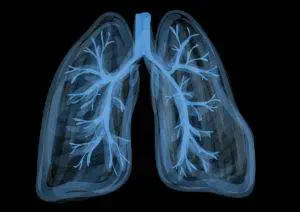
By Qineng Tan, L.Ac., Ph.D. & Xiaomei Cai, L.Ac., Ph.D.
Cystic fibrosis (CF) is a genetic disease that causes phlegm or mucus in the body to be too thick and sticky, which can lead to malfunctioning of vital organs. Cystic fibrosis can cause infections and ultimately, damage to the lungs, heart, and digestive system. Acupuncture and TCM can provide complementary treatment for cystic fibrosis symptoms.
CF disease causes serious problems throughout a person’s system due to the production of abnormal mucus (sometimes spelled mucous). Mucous should be mostly made of water, so that it provides lubrication in and around the major organs. Mucus that does not have the right balance of water and salt can clog parts of the body, especially the airways, making it difficult to breathe. The thick mucus can also cause blockages in the digestive system.
Cystic fibrosis is caused by mutations of the CFTR gene, which provides the information for producing the CFTR protein. When this protein doesn’t work right, it can lead to the wrong amount of salt or water in the mucus. If mucus is too sticky, then organs like the lungs, intestines, and liver have a hard time doing their respective jobs. Thick mucus in the pancreas, in particular, can cause digestive problems, malnutrition, and can affect insulin production, leading to diabetes.
As recently as a few decades ago, it used to be that children with CF rarely lived into adulthood. Now, CF life expectancy has increased due to advances in cystic fibrosis treatment. Current cystic fibrosis life expectancy statistics show that the average person with CF will live into their mid-40s; there are now many senior citizens still living with CF, and there are more adults with cystic fibrosis than children.
There are many different types of cystic fibrosis treatment, which can help reduce symptoms and complications. Medical treatment for cystic fibrosis aims to change the quality of the mucus, clear mucus from the lungs, reduce chances of infection, and improve the absorption of nutrients from food. Acupuncture and other TCM treatment for cystic fibrosis can also be used to help improve these CF symptoms.
Cystic Fibrosis Symptoms
Signs of cystic fibrosis symptoms in infants may look different than CF symptoms in adults. A person is born with CF, but different symptoms may develop over time.
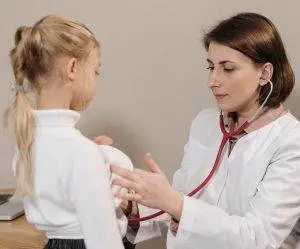
Symptoms of cystic fibrosis in children may include:
- Salty sweat, skin tastes salty
- Phlegmy cough, coughing up blood
- Wheezing, trouble breathing
- Poor growth, low weight, failure to thrive
- Greasy stool or constipation
- Gassy, stomach ache, pain in belly
- Finger clubbing, clubbed fingers, or clubbed toes
Other, deeper health problems may develop as children with cystic fibrosis grow, including: lung infections, sinus infections, pancreatitis, gallstones, liver disease, diabetes, rectal prolapse, or high blood pressure in the lung arteries that can lead to heart failure.
Most people are diagnosed with cystic fibrosis while they are still very young, but it is possible for a person to grow into adulthood without knowing they have CF.
Adults with cystic fibrosis may experience:
- Decreased immune function, low levels of antibodies
- Liver problems, cirrhosis
- Lack of digestive enzymes due to low functioning of the pancreas
- Intestinal blockages
- Low absorption of nutrients due to mucus in the intestinal tract
- Infertility in men; male infertility
- Bone disease, arthritis
Cystic Fibrosis Genetics
Cystic fibrosis is a chronic disease that is caused by a recessive gene. Cystic fibrosis inheritance means that both parents have a mutated copy of the CFTR gene; in other words, each parent is a cystic fibrosis carrier, even though in most cases, neither parent has CF or cystic fibrosis symptoms.
Cystic Fibrosis Diagnosis and CF Testing
Most newborn babies are tested for signs of cystic fibrosis in the U.S., so parents will usually learn that their child has CF soon after birth. This way, cystic fibrosis treatment can be implemented immediately, which offers the best chances of keeping CF disease under control.
Initial screening for CF involves first checking for high levels of IRT, a chemical protein released by the pancreas. High levels of IRT can be an indicator of CF or other problems with the pancreas; although, it can also be related to infant stress or premature delivery. If the IRT is high, then other tests will be performed.
A sweat test is considered the primary way to diagnose cystic fibrosis. Sweat is collected from the skin. If it shows high levels of salt, or chloride (a chemical component of salt), this is an indication that a person has CF.
Genetic testing, or CR carrier testing, will usually be performed in order to confirm the CF diagnosis, and so that the specific genetic defects that will affect the patient’s health are understood fully.
Cystic Fibrosis Treatment
Up until recently, most CF treatments were aimed at helping to provide symptomatic relief. Cystic fibrosis medications include drugs that can help thin mucus, bronchodilators to help open the airways, and antibiotics to help prevent and control infections. Many of these medications are inhaled through a nebulizer.
A cystic fibrosis vest is a machine worn around the chest that vibrates and can be used as a daily therapy to help clear mucus from the lungs.
More recent advances have led to the development of genetic therapies for cystic fibrosis. CFTR modulator therapies address the underlying CF causes having to do with cell membranes and the CFTR protein. This new treatment may be able to improve lung function in patients who have the most common form of CFTR gene mutation.
People with CF need to eat more calories and a higher fat diet in order to be able to maintain a healthy weight and get enough nutrients, so they are usually prescribed a special cystic fibrosis diet to help them achieve this.
Cystic fibrosis is a chronic illness that requires constant care. TCM and acupuncture can provide a meaningful adjunct treatment to medical therapies to improve quality of life and longevity.
Can Acupuncture Help Cystic Fibrosis?
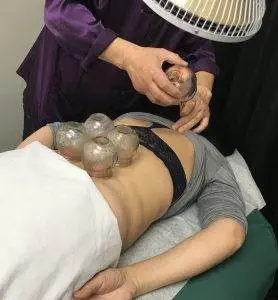
Centuries before medical science began to understand how genetic diseases are passed down, TCM has acknowledged that certain conditions are part of a person’s constitution when they are born.
According to TCM theory, we are all born with Qi. Some Qi can be replenished (Postnatal Qi), and other Qi is given to us at birth in a finite amount (Yuan Qi, or Ancestral Qi).
Difficulty with breathing and digesting food causes people with CF to have a harder time replenishing Qi. They also have less of the finite type of Qi, so they must take extra care to preserve it. Because of this weaker Qi, the organ systems of the body have deficiencies that must be helped with nourishment and care. Kidney deficiency, which is related to the weaker Yuan Qi, can lead to lack of fluids in the body, as is typical in CF. TCM can help improve organ function through modalities like acupuncture, cupping, herbs, and nutrition.
TCM methods used in combination can help to clear phlegm from the lungs and other organs. This, in turn, will help a person fight off infections better.
Cupping, a modality that creates suction to increase circulation can help draw congestion from the lungs. Chinese herbs and the right nutrition program can help to improve the balance of fluids in the body, to help thin mucus.
Many adults with cystic fibrosis experience chest pain, gastrointestinal pain, and/or headaches. Acupuncture has been shown to decrease these types of pain.
Acupuncture Near Me for Cystic Fibrosis, Los Angeles Area
Living with a chronic illness is an everyday challenge. It is necessary for patients with Cystic fibrosis to build a team of healthcare professionals who can support them with the right treatment for their individual needs. An acupuncturist takes into consideration the whole person: their specific symptoms, and also their mental and emotional health. Regular visits with a TCM doctor can help alleviate the physical symptoms of CF, but also help maintain emotional balance, addressing feelings of depression and anxiety. If you or someone you know has cystic fibrosis, please consider adding acupuncture to your healthcare plan.
*This article is for education from the perspective of Traditional Chinese Medicine only. The education provided by this article is not approved by FDA to diagnose, prevent, treat and cure human diseases. It should not stop you from consulting with your physician for your medical conditions. Traditional Chinese Medicine is based on Qi, which is an invisible force that usually cannot be observed by modern science. Because science focuses on testing ideas about the natural world with evidence obtained through observation, these aspects of acupuncture can’t be studied by science. Therefore acupuncture and Chinese herbs are often not supported by double-blind, randomized trials, and they are considered alternative medicine therapies in the United States.
How to Detox With Acupuncture and TCM
By Xiaomei Cai, L.Ac., Ph.D. & Qineng Tan, L.Ac., Ph.D.

Why is it important to do a detox or body cleanse periodically? When done with the right support from an acupuncturist near me, detoxing can help improve your digestion, immune function, fertility, and many other aspects of your health. Store bought colon cleanse products or a juice cleanse won’t really do the job, though. A detox program with acupuncture and Chinese herbs will do more to optimize your health than just a detox diet will.
When we recommend our Detox Program at Art of Wellness, we are not talking about fasting or detox drinks, like a master cleanse. The goal of our program is to detoxify the organ systems of the body: it’s a liver detox, kidney cleanse, lungs, heart, and spleen. This is a full body cleanse designed to give you a health reset. According to TCM philosophy, your body knows how to repair and renew itself, but it cannot do this job when it is congested and out of balance.
In TCM, we have a broad concept of what “toxins” are and how they can affect our bodies and our health. Toxic chemicals that come from our environment, such as food additives, pesticides, cleaning products, and beauty and hygiene products are certainly part of the problem. Drugs, medicines, alcohol, and unhealthy foods can also be toxic. So can behavioral habits, like sitting and looking at our screens and devices too long.
But our own bodies produce toxins, too. The waste products our organs create are “toxic,” and if they are held in the body too long without being adequately cleared out, they can negatively impact organ function. Imbalances in the system can cause conditions of excess heat or phlegm, which can lead to all kinds of problems with both your physical and mental health.
Stress, lack of sleep, and extreme emotions can also contribute to toxic conditions in the body and mind. When the organ systems are out of balance, the body is under constant pressure to keep functioning, but we do not feel our best.
Signs you need to detox include:
- Fatigue, low energy, tired all the time
- Foggy head, memory problems, trouble concentrating
- Constipation
- Trouble sleeping, insomnia
- Weight gain
- Hair loss
- Hormone imbalances
- Signs of rapid aging
- Skin rash, acne
- Fingernails are brittle, lined or ridged
- Severe PMS symptoms or menopause symptoms
- Headaches, migraine
- Water retention, edema, swelling in extremities
Inflammation is largely created by toxic conditions in the body, and most pain conditions and chronic illnesses stem, at least in part, from inflammation somewhere.
Why You Need a Liver Detox
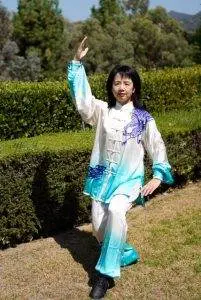
In conventional medicine, we think of the liver as being a sort of filter that removes toxins from the blood and helps metabolize fat. In TCM theory, we consider the liver to be the storehouse and distributor of blood; therefore, it also plays a crucial role in the menstrual cycle. The liver is also strongly connected to a person’s emotional life.
Stress, lack of sleep, too much sugar, alcohol, fatty, fried foods, pharmaceutical medicines, and recreational drugs all tax the liver above and beyond what it needs to do just to keep the blood flowing to nourish the body. When too many demands are placed on the liver, it can cause all kinds of symptoms, including: fatigue, insomnia, and headaches. Feelings of anger, frustration, anxiety, and irritability may arise. Conversely, when a person is feeling bitter and resentful, and isn’t able to express it, those unresolved emotions may begin to cause trouble with liver function.
Just as the liver governs the blood, in TCM, the kidneys govern the water of the body, controlling elimination through the bladder, and maintaining blood pressure by keeping the right amount of water in the bloodstream. Signs that the kidneys are not balanced include: problems with blood pressure, edema, puffiness in the face or extremities, UTIs, chronic fatigue, and menopause symptoms, like dryness and hot flashes.
Detoxing the organ systems, including the liver and kidneys especially, can help rejuvenate the digestion and allow better nutrition to reach all parts of the body, as the quality and flow of blood and other bodily fluids will be improved.
Making sure that your excretory system is in good working order before starting a cleanse is important. If you are already having problems with constipation, for example, we will want to make sure we get things moving before we start cleansing the organs. Our detox also focuses on the body’s largest excretory organ: the skin.
Top 10 Reasons To Detox

It is a good idea for everyone to detox periodically; detoxing every six months is reasonable for most people. Sometimes we will specifically recommend a detox for a patient when they are struggling with a particular health problem, or if they are planning a pregnancy.
Detoxing can help:
- Boost Immunity – a cleanse will help get your lymphatic system, which produces and transports immune cells and removes waste from cells, moving, improving the efficacy of your immune system.
- Break Free From Addiction – if you are ready, a commitment to the detox program and food plan can help you end patterns of substance abuse, drug use, alcohol addiction, smoking, and other types of dependency.
- Infertility – We often advise people who come to Art of Wellness for fertility treatment to begin with the Detox Program. Not only will this help increase the chances of conception occurring, whether naturally or with the aid of ART, but it will also lay the foundation for your child’s health in the future.
- Improve sleep – This works both ways. In order for the body to do its routine daily work of removing toxic waste, it needs plenty of sleep. The Liver, in particular, is working hard through the night to clean and deliver fresh blood to the cells. Sleeping on your side enhances your body’s ability to do this work, allowing the internal organs to drain properly. When your body is functioning well, your sleep will be of better quality, more restful and refreshing.
- Improve skin and hair – Dull eyes and skin, dark circles or bags, puffiness, and thinning hair are signs of stagnant blood and Qi. Nutrients from the right foods and Chinese herbs help to nourish the skin, and clear heat, dampness, and dryness. When old cells are removed, hair and eyes can shine again. Acupuncture treatment can help stimulate collagen production, which also happens while you sleep.
- Weight loss – While our acupuncture detox is not about how to lose belly fat fast, many people will find that it gives them a good foundation for new eating habits. Detoxing the liver and kidneys will help your body metabolize fat better.
- Balance hormones – severe PMS symptoms, bloated stomach and mood swings, perimenopause symptoms, infertility in women and infertility in men (oligospermia) can all be improved when hormone function improves. Acupuncture treatment can also help relieve conditions like PCOS, fibroids/leiomyoma, and endometriosis for women, and BPH in men.
- Reduce inflammation – many illnesses and pain conditions are inflammatory in nature. If you are suffering from pain due to plantar fasciitis, gout, rheumatoid arthritis, tennis elbow, carpal tunnel syndrome, shoulder or hip pain, acupuncture can help.
- Increased energy – better nutrition, better circulation, better sleep, and better organ function will all work synergistically to help you feel more energetic.
- Chronic illness – many chronic illnesses are rooted in toxic conditions within the body or exposure to toxins. Hard-to-treat conditions like autoimmune conditions and other systemic problems may be helped with alternative medicine when conventional medical treatments have not been successful. We treat many conditions with acupuncture and herbs, such as: lupus, lyme disease, celiac disease, fibromyalgia, and Crohn’s disease. We also provide support for people going through cancer treatment.
7 Steps of Detox Program With TCM Acupuncture and Herbs
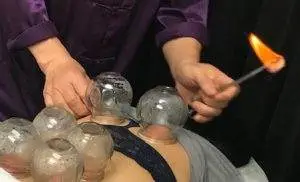
Pain and dysfunction occur when there is imbalance and when there are areas of stagnation within the body. Think of the metaphor of a house that needs to be deep-cleaned; there are dark corners of the body that have been ignored for a while, where dust and cobwebs have gathered. The Detox program reaches into these pockets of stagnation, sweeps them clean, and makes sure they get some fresh air and sunlight shining on them, in the form of invigorated Qi and blood.
- Acupuncture Treatments – the primary goal of acupuncture treatments during the detox phase is to get Qi moving freely, remove blockages, and to assist in elimination of toxins from the body.
- Cupping Treatment – the TCM modality of cupping creates a vacuum-like suction that moves Qi and blood from the innermost parts of the body outwards. During the detox program, cupping helps to pull toxins out of the lungs and other organs.
- Detox Herbs – the Chinese herb detox tea helps to clear heat and toxins from the body and improve digestion and elimination.
- Foot Pad Detox – detox foot patches, worn as you sleep at night and removed in the morning, help to pull toxins and fatty deposits from the body.
- Detox Bath – Sweating is an excellent way to remove toxins through the skin; this is why so many traditions rely on saunas and hot baths. Our herbal sachets allow you to enjoy a therapeutic herbal soak in your own bathtub.
- Exercise – Your acupuncturist will instruct you on how to practice daily exercises, based on QiGong movements, that will help to get Qi and blood moving.
- Nutrition – the food plan during the detox is based on whole grains, lean proteins, and plenty of vegetables, flooding your system with nutrients.
Detox Near Me Los Angeles, Westside
The beginning of the year, springtime, after recovery from a long illness, while preparing for a healthy pregnancy–anytime may be the right time for you to detoxify your system and get a fresh start. We recommend that you take the time to dedicate yourself to a week of cleansing with the Art of Wellness Detox Program at least twice a year for optimal health benefits.
*This article is for education from the perspective of Traditional Chinese Medicine only. The education provided by this article is not approved by FDA to diagnose, prevent, treat and cure human diseases. It should not stop you from consulting with your physician for your medical conditions. Traditional Chinese Medicine is based on Qi, which is an invisible force that usually cannot be observed by modern science. Because science focuses on testing ideas about the natural world with evidence obtained through observation, these aspects of acupuncture can’t be studied by science. Therefore acupuncture and Chinese herbs are often not supported by double-blind, randomized trials, and they are considered alternative medicine therapies in the United States.
How to Treat Celiac Disease With Acupuncture and TCM
By Qineng Tan, L.Ac., Ph.D. & Xiaomei Cai, L.Ac., Ph.D.
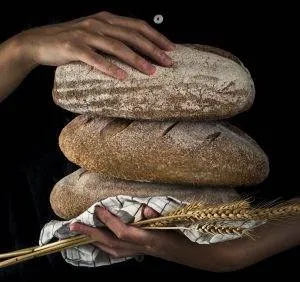
Do you have digestive problems like a bloated stomach, diarrhea, and abdominal pain? Unintentional weight loss, fatigue, skin rashes? These can all be signs of Celiac disease. Different from food allergies, Celiac is a serious autoimmune disorder that can lead to malnutrition and other debilitating health problems. TCM herbs and acupuncture treatment offer a good alternative way of managing Celiac disease and gluten intolerance symptoms.
In recent years, you have probably heard a lot of people saying they are switching to a gluten free diet because they have a gluten allergy or gluten intolerance. Sometimes people may just be trying to see if they feel better when they cut out wheat products, or they are going on a low carb diet to help them lose weight. Other people may be experiencing symptoms like diarrhea and nausea and hope that going on an IBS diet will help.
What is gluten? Gluten is a protein that is present in some grains, including wheat, barley, and rye. When a person has Celiac disease, gluten is perceived by the immune system as a dangerous foreign substance, triggering an immune response. Antibodies (white blood cells) are produced as a reaction to gluten entering the body, and the antibodies end up causing inflammation and damage to the inside of the intestinal tract.
This damage to the small intestine is called villous atrophy, and this is what causes inflammation and malabsorption of nutrients, leading to the myriad symptoms of Celiac. Celiac symptoms vary widely, and can include both digestive problems, and other conditions, like anemia, that stem from the lack of proper nourishment to the body.
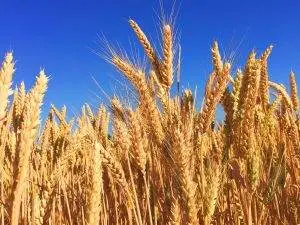
There is such a thing as a true wheat allergy, which for some people causes respiratory problems like difficulty breathing and nasal congestion, and other allergy symptoms like swelling and itching around the mouth and throat, hives or other itchy skin rashes, and headaches. Wheat allergies are a response to chemical compounds in wheat, which is found in a wide variety of food products. In some cases, exposure to wheat can cause anaphylaxis, which requires emergency medical attention because it can involve trouble breathing and swallowing, chest tightening, throat swelling, dizziness, and fainting.
Some doctors now recognize gluten intolerance or non-celiac gluten sensitivity as a separate condition from Celiac disease. For some people, gluten causes an immune response and symptoms, but not the same kind of damage to the intestines that Celiac does. If gluten intolerance is suspected, then following a gluten free diet for a period of time and noticing if symptoms clear up is usually the recommended course of action.
Celiac disease tends to run in families, and so is considered to be passed genetically. People can begin to show signs of Celiac at any age. It is estimated that at least 1% of the population has Celiac disease, but that number may be significantly higher, as it is still not a very well understood condition. Many people who have Celiac disease are unaware of it, or have been misdiagnosed with other conditions. Researchers believe that the incidence of Celiac disease is increasing worldwide, probably due to some environmental factors.
Acupuncture and TCM herbs provide a holistic way to treat Celiac disease, relieving the painful symptoms and providing detailed guidance for lifestyle and dietary changes that can help people manage Celiac and gluten intolerance. Nutrition is considered to be one of the primary branches of TCM, along with acupuncture and herbs. A TCM practitioner will be able to give you dietary recommendations far beyond just telling you to eat gluten free foods.
Top 10 Celiac Disease Symptoms
People can experience a variety of gluten intolerance symptoms, including digestive problems, allergy symptoms like skin rash, and other symptoms related to nutritional deficiency, like anemia and weight loss. Signs of gluten intolerance may be different in children, who are more susceptible to malnourishment that can lead to a failure to thrive.
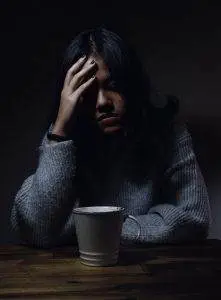
Celiac symptoms include:
- Fatigue
- Weight loss
- Diarrhea, pale colored stools, foul-smelling, fatty, greasy stool
- Abdominal bloating, bloated stomach, gas, stomach pain, abdominal pain
- Nausea, vomiting
- Constipation
- Headache, headaches, migraines, migraine headaches
- Skin rash, mouth ulcers, mouth sores, canker sores
- Neuropathy, numbness or tingling in hands and feet, problems with balance, joint pain
- Cognitive problems, foggy head, difficulty concentrating
Celiac can lead to SIBO, anemia, iron deficiency, loss of bone density (osteoporosis), weak bones, soft bones, bone loss (osteopenia), joint pain, or arthritis. People can also have liver problems, including fatty liver.
Dermatitis herpetiformis is a specific type of skin rash that causes itching and blisters to appear, primarily on the knees, elbows, torso, top of the head, and buttocks.
Women may find that celiac disease affects their hormones, menstrual periods, and can have an impact on fertility, even causing recurrent miscarriages.
Celiac disease can also contribute to infertility and low sperm count in men.
When a child develops celiac disease, the inability to absorb nutrients from food can cause problems with normal growth, such as short stature, delayed puberty, and damage to tooth enamel. Developmental disorders and behavioral issues can also be related to celiac, like ADD/ADHD and irritability.
In extreme cases, Celiac can cause seizures.
Celiac Disease Diagnosis and Treatment
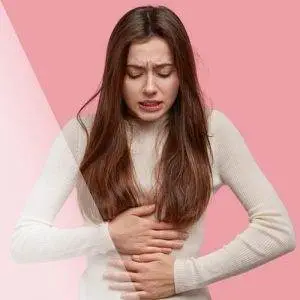
Going through the process of being diagnosed with Celiac disease or gluten intolerance is quite complicated and involves multiple tests. From the medical standpoint, it is best that you do not eliminate gluten or change your diet before the testing, so that it can accurately show how gluten is affecting your immune system and your intestines.
First, you will probably have a blood test that looks for certain antibodies that would indicate an autoimmune reaction to gluten. Some people may test negative for antibodies, and yet still have Celiac, though, so this blood testing is not enough to be conclusive. Genetic testing may be done, which looks for specific antigens to rule out Celiac. If testing shows that a person has antibodies, and they also have a specific type of skin rash (dermatitis herpetiformis), that is usually enough for a doctor to give an official diagnosis of Celiac disease.
Endoscopy is an imaging test which uses a little camera to see if there is damage to the intestinal lining. They will also take some tissue samples from the lining of the intestine to check for inflammation and damage. The results of these tests may lead to a formal Celiac diagnosis. People will often need to have an endoscopy to find out if they have Celiac disease, and then possibly repeated endoscopies to see if the inflammation is getting better or worse.
Sometimes people will try figuring out what is going on themselves with a food sensitivity test or food intolerance test kit that you can do at home and send in for results. Food allergy testing may give you some information as to whether you have a reaction to a specific allergen (egg allergy, milk allergy, peanut allergy, shellfish allergy) or have a food sensitivity, but they cannot tell you if you really have Celiac disease or gut inflammation.
Going through the diagnostic process for autoimmune diseases like Celiac disease can be exhausting in and of itself. Meanwhile, you aren’t yet getting treatment for your symptoms. The only treatment available in conventional medicine for Celiac disease really is to follow a gluten free diet. Most doctors are not able to do much beyond give you a list of foods you shouldn’t eat, or refer you to a dietitian.
TCM has the ability to provide more comprehensive care for people with Celiac disease, and many other autoimmune conditions. Acupuncturists are highly trained professionals when it comes to offering patients detailed guidance for following an effective Celiac disease diet.
Can Acupuncture Help Celiac Disease and Gluten Intolerance?

TCM has more to offer than just acupuncture treatment and herbal medicine. Nutrition is one of core competencies every TCM practitioner must master.
Acupuncture treatment can help relieve digestive symptoms like abdominal pain and bloating, and also have a positive impact on the system malfunctioning that leads to autoimmune reactions. With Chinese herbs, we are able to get very potent nutrients into the body that wouldn’t normally come from food. For people with Celiac, or other problems like food allergies or sensitivities, malnutrition due to malabsorption is a real problem.
A TCM nutrition approach can help restore the body’s health with foods and herbs better than a simple elimination diet for Celiac disease can. An acupuncturist listens carefully to the particular symptoms and sensations you describe. These provide important clues as to which organ systems are involved, and where yin and yang are out of balance. Then TCM provides a framework for tailoring the treatment and food plan for Celiac disease to each individual’s needs.
According to TCM theory, the stomach and spleen are responsible for digesting food. Celiac disease symptoms are, according to a typical TCM diagnosis, related to a spleen deficiency. When Qi in the spleen is weak, the body is not getting the nutrients it needs. Building up the strength of the spleen will often be the focus of the acupuncture portion of the treatment. Herbs and specific nourishing foods will be recommended, which will help anemia and soothe the digestive tract.
Acupuncture Near Me For Celiac Disease, West Los Angeles
Autoimmune diseases like Celiac disease can be especially frustrating because they seem to take over your whole life. Not only physical health, but mental health is compromised. Treatment options are limited. Fortunately, TCM offers a complementary form of medicine that is able to provide multi-faceted care for autoimmune disorders like Celiac, including: Crohn’s disease, Type 1 diabetes, hyperthyroidism, Lupus, rheumatoid arthritis, fibromyalgia, and multiple sclerosis (MS). Acupuncture treatment can help reduce feelings of anxiety and depression as you learn to manage your illness.
If you or someone you know has been suffering from digestive issues, and you suspect it may have something to do with gluten intolerance or Celiac disease, be prepared to go through testing, but also give some thought to adding a TCM provider to your health care team. At Art of Wellness, we have over 35 years of providing excellent care through TCM treatments, including expert nutrition services. It is like getting an acupuncturist and dietitian in one.
*This article is for education from the perspective of Traditional Chinese Medicine only. The education provided by this article is not approved by FDA to diagnose, prevent, treat and cure human diseases. It should not stop you from consulting with your physician for your medical conditions. Traditional Chinese Medicine is based on Qi, which is an invisible force that usually cannot be observed by modern science. Because science focuses on testing ideas about the natural world with evidence obtained through observation, these aspects of acupuncture can’t be studied by science. Therefore acupuncture and Chinese herbs are often not supported by double-blind, randomized trials, and they are considered alternative medicine therapies in the United States.